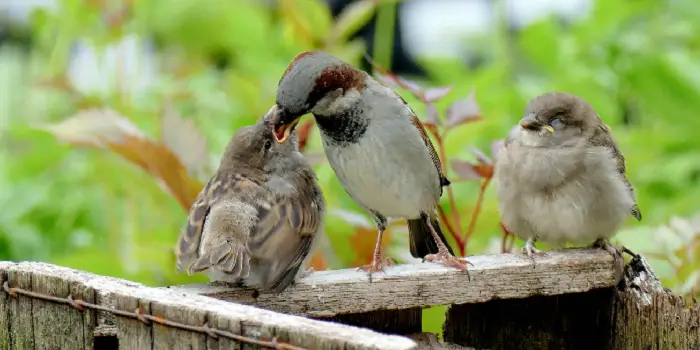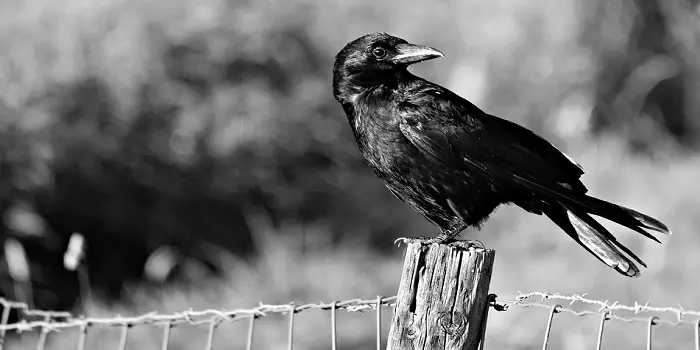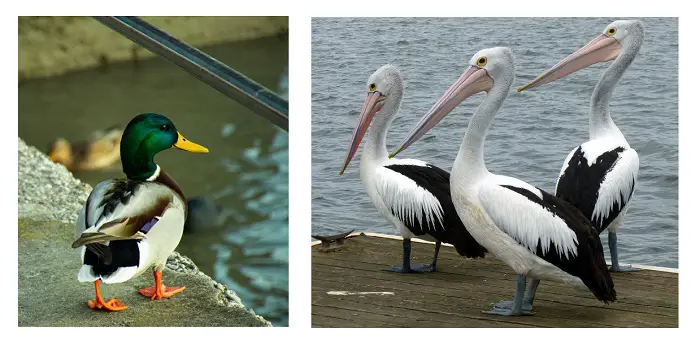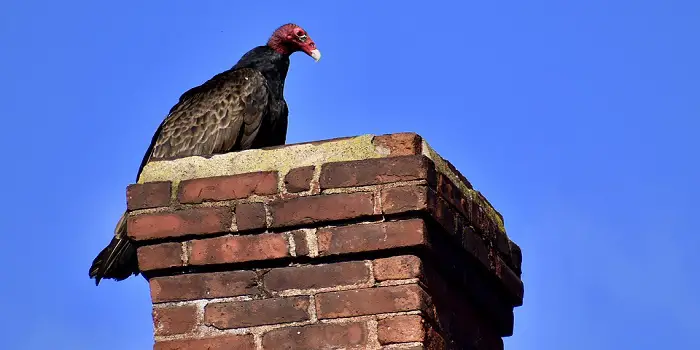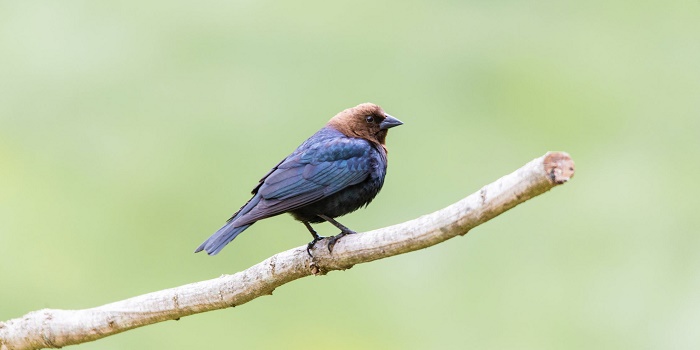
The cowbird is an interesting creature, most noted for hanging around cattle and bison, where they got their name.
The birds are not interested in the animals but rather the insects that are kicked up when the cattle or bison graze.
And while cowbirds may not be the most pleasing sight, there is not much you can do about it since they are protected under the Migratory Bird Treaty.
Cowbirds belong to the Icteridae family under the genus Molothrus.
They are most commonly found in North America, and there are six basic types.
- Bronzed
- Brown-Headed
- Giant
- Screaming
- Shiny
The sixth type is a non-brood parasitic version known as agelaiodes.
What all cowbirds have in common is that the adults do not raise their young, and they do not build nests either.
The male cowbird is noted for its black plumage and dull brown coloring of its head.
Females have plain brown feathers and white throats, and when young, their undersides will have a white streak.
Cowbirds are in the smaller range of blackbirds, with most adults standing about 7 ½” tall.
A brown-headed cowbird will have a stout bill that is a relatively short and stocky body.
While following cattle around may seem harmless, the cowbird can cause trouble in ways that you might not expect.
First, they take over the nests of other birds to lay their eggs.
This earns them the name of brood parasites as they reduce the population of the birds whose nest has just been stolen.
Are Cowbirds Bad?
It may depend on your point of view, but even though cowbirds do not attack humans, many humans still do not like the sight of cowbirds.
Perhaps it is because songbirds raise the cowbirds since the adult cowbirds want nothing to do with them that causes the wrong impression.
However, cowbirds do serve an essential function as they consume harmful insects that eat plants raised on farms.
This is why exterminating cowbirds or getting rid of their eggs is against the law.
It is true that permits to control the cowbird population can be granted, but only under certain circumstances, such as when their presence harms other bird species.
So, despite the initial impression that cowbirds generate, they are a protected species and do greater good than harm, especially for humans.
They may indeed harm other bird species by their presence,
Nesting Habits of Cowbirds?
From mid-April to mid-July, cowbirds start their breeding season.
This typically consists of females laying one egg per day for around six or seven days.
They generally lay one egg per nest that they find.
This is a process that may go on for some time, but with intervals that range from a few to several days.
One recorded case of a female cowbird laying 40 eggs helped advance her species that year.
Before laying her eggs, a female cowbird will scan the area for existing nests that she can use.
She will often wait until the other birds complete their nest before moving in.
If the bird has already laid eggs in the nest, the cowbird will get rid of one or two of them first before laying her eggs.
It’s a one-to-one trade in terms of replacing eggs.
She will leave one or two behind if there are no eggs in the nest.
One of the assets the cowbird has developed into lay eggs rather quickly.
The entire process often takes around 20 seconds.
The bird who built the nest may never know of the cowbird’s presence.
Depending on the bird species of the nest builders, the cowbird’s eggs may or may not survive.
This comes down to size, as most finches or wrens are simply not big or strong enough to cast out the cowbird egg.
However, there are some species that are big enough, and they include the following.
- Blue Jay
- Brown Thrasher
- Cedar Waxwing
They will destroy the cowbird’s eggs. But the cowbird may return to destroy the host’s eggs in response.
Assuming that the cowbird egg survives, it will tend to hatch a day or so earlier compared to the host eggs.
Once the young cowbird is alone, it will recognize its fellow cowbirds.
Once they are old enough, the cowbirds will tend to gather together in the late fall.
When winter arrives, you may find brown-headed cowbirds joining the roost of blackbirds that are already present in the area.
That is why you often see many cowbirds together because they live in a roost for protection.
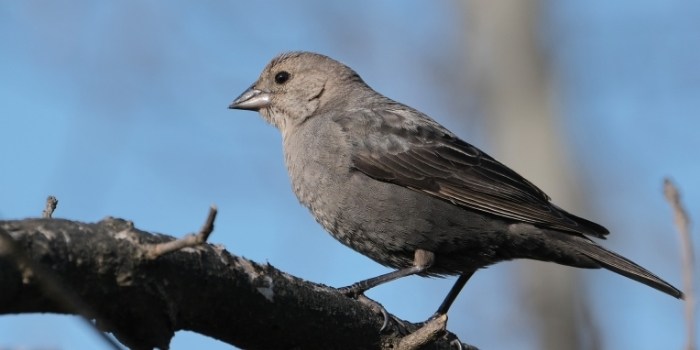
How Can You Get Rid of Cowbirds?
You have to be a pretty smart bird to survive despite humans’ hatred.
But if you do not want them around, it can be tricky to do so while obeying the law.
Eradication is not an option, but there are some effective ways to get rid of the cowbirds while still following all rules and regulations that cover their treatment.
a) Avoid Certain Bird Foods
The easiest way to keep cowbirds off your property is to not provide them with a food source.
If you stop feeding them, they will go somewhere else.
Such foods that will attract cowbirds include the following.
- Grains
- Lettuce
- Peppers
- Sorghum
- Sunflower Seeds
- Sweet Corn
- Tomatoes
This is only a short list of what not to leave out for cowbirds.
But there are certain foods that cowbirds do not like at all.
- Safflower Seeds
- Seut
- Whole Peanuts
Cowbirds are no fans of these foods, so use them when feeding the birds or animals around your place.
b) Clean the Area
If you are feeding other birds, sweep up any feed that is remaining.
Otherwise, you will attract the cowbirds to the area.
Keep in mind that even though cowbirds prefer insects and worms, they have no hesitation eating bird feed if it is left out.
c) Do Not Bird Scout
Scouting for birds when you have cowbirds in the area is not a good idea.
This is because cowbirds are natural hunters and look for clues in terms of food sources and nests where they can lay their eggs.
If they see you scouting for birds or providing food for some wild birds, they will follow you around and locate their nest.
It will not take long for a cowbird to find a new nest, kick out a few eggs, and lay its own.
If you want to avoid that, do your bird scouting when the cowbirds are nowhere near the area.
If that is not possible, find another way to take care of small birds in your area.
d) Select Feeders that are Small
You will need to choose a small feeder if you want to feed some birds, but not the cowbirds.
Avoid platform feeders as they are large and can hold a typical cowbird.
Instead, you’ll want a feeder that is small enough to keep out a cowbird but large enough to feed the birds you like.
Such feeders are enough to make the cowbirds go somewhere else.
e) Tube Feeders
Cowbirds can be wily, but they also have their flaws.
Tube feeders have frustrated cowbirds for a very long time.
While the cowbird can see or at least detect the food, they cannot get at it.
After a while, they will give up and stay away.
Meanwhile, there are other birds small enough to get at the food, which makes tube feeders a great approach.
The Conclusion
It’s not easy to keep cowbirds away.
This is especially true on farms where cowbirds are often found in pastures following around the cattle.
It’s difficult to keep them away under those circumstances because they have a readily available food source.
Plus, you do not want them to go away entirely if you have a farm because the cowbirds will get rid of some harmful insects.
But if you do want to keep them away from your home, you will have to come up with an effective plan and carry it out.
And if that doesn’t work, try another plan until you find one that succeeds.
Just remember that you cannot destroy either the cowbird or the eggs as that is illegal.
Admittedly, it can become frustrating to be outwitted by a bird. But this is not your ordinary bird.
Its entire species is built around being observant and clever.
Add to that their strong instinct for survival, and you should feel no shame if it takes a determined effort to keep the cowbirds away from your property.

Welcome to ProShieldPest.com. I am Tina Jones. I have been working as a pest removal professional in Winslow, Arizona lately. At present, I love to spend my time with my family as a retiree.
Here I share all my knowledge and experiences to help people understand better how they can stop pests at their homes without actually killing them. Hopefully, the information you will find here will help in safeguarding your home! You can check more about me here.

